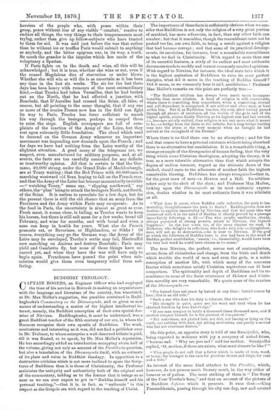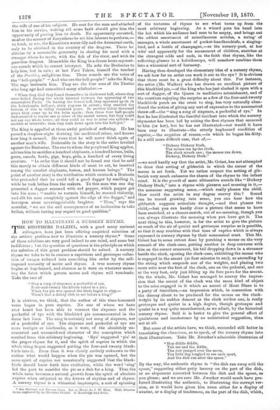BUDDHIST THEOLOGY.
CAPTAIN ROGERS, an Engineer Officer who had employed the time of his service in Burmah in making an acquaintance with the language and literature of the country, has translated, at Dr. Max Miiller's suggestion, the parables contained in Budd- haghosha's Commentary on the Dhanznapada, and so given us new means of understanding a matter of the highest intellectual in- terest, namely, the Buddhist conception of their own special doc- trine of Nirvana. Buddhaghosha, it must be understood, was a great Buddhist teacher of the fifth century of our era, in whom the Burmese recognize their own apostle of Buddhism. The work, meritorious and interesting as it was, did not find a publisher even in Mr. Triibner, to whose enterprise a well-deserved tribute is paid, till it was floated, so to speak, by Dr. Max Miiller's reputation. He has accordingly added an introduction occupying about half of the volume, giving not only an account of the Parables in question, but also a translation of the Dhamnapada itself, with an estimate of its place and value in Buddhist theology. In opposition to a destructive criticism which is not more inclined to spare the Scrip- tures of Buddhism than it is those of Christianity, the Professor maintains the antiquity and authenticity both of the original and of the commentary, holding as to the former that it brings us as near as we can ever expect to get to "Buddha himself and his personal teaching,"—that it is, in fact, as " authentic " in this respect as the Gospels are with regard to the teaching of Christ.
The importance of these facts is sufficiently obvious when we con- sider that Buddhism is not only the religion of a very great portion of mankind, has more adherents, in fact, than any other faith can _ number; but that it resembles, though the resemblance must not be pushed too far, our own faith, in being a revolt against a religion that had become corrupt ; and that some of its practical develop- ments, its asceticism, for instance, bear a remarkable resemblance to what we find in Christianity. With regard to more than one of its essential features, a study of its earliest and most authentic documents tends to modify and correct commonly received opinions. With regard to Nirvana, for instance, the ideal state into which it is the highest aspiration of Buddhism to raise its most perfect disciples, what did it mean in the teaching of Buddha himself? Did it mean, as we commonly hear it said, annihilation ? Professor Max Miller's remarks on this point are perfectly true :—
"The Buddhist nihilism has always been much more incompre- hensible than mere atheism. A kind of religion is still conceivable, where there is something firm somewhere, when a something, eternal and self-dependent, is recognized, if not without and above man, at least within him. But if, as Buddhism teaches, the soul, after having passed through all phases of existence, all the worlds of the gcds and of the higher spirits, attains finally Nirvana as its highest aim and last reward, i.e., becomes utterly extinct, than religion is not any more what it meant to be,—a bridge from the finite to the infinite, but a trap-bridge hurling man into the abyss at the very moment when he thought he had arrived at the stronghold of the Eternal."
Where there is no God there can be no absorption ; and for the soul that ceases to have a personal existence without being absorbed there is no alternative but annihilation. It is a remarkable thing, a strange example of the divergencies of human feeling, that the very thing which some Christian theologians, adopting the theory, it is true, as a more tolerable alternative than that which accepts the dogma of endless torment, regard as the ultimate doom of the wicked, should seem to the adherents of another faith the highest conceivable blessing. Buddhism has always recognized—that is, for the great mass of men—a Heaven and a Hell. Its nihilism refers only to the elect of the elect ; and Professor Max Muller, looking upon the Dhamnapada as its most authentic expres- sion, doubts whether in its most authentic form it was nihilistic at all.
"What does it mean, when Buddha calls reflection the path to im- mortality, thoughtlessness the path to death? Buddhaghosha does not hesitate to explain immortality by Nirvana, and that the same idea was connected with it in the mind of Buddha is clearly proved by a passage immediately following, v. 23 :—"The wise people, meditative, steady, always possessed of strong powers, attain to Nirvana, the highest happiness.' In the last verse, too, of the same chapter we read, 'A Bhiksher, who delights in reflection, who looks with fear on thoughtless- ness, will not go to destruction,—he is near to Nirvana. If the goal at which the followers of Buddha have to aim had been in the mind of Buddha perfect annihilation, amata,' i.e., immortality, would have been the very last word he could have chosen as its name."
The true Nirvana, the perfect, serene rest of contemplation, secure from all vicissitudes and change, from the birth and death which trouble the world of men and even the gods, is a noble conception of another life, with which many of the sensuous fancies which sometimes satisfy Christian aspirations can ill bear comparison. The spirituality and depth of Buddhism and its re- semblance to some of the finest utterances of Hebrew and Chris- tian morality are very remarkable. We quote some of the maxims
of the Dhantnapada :— " For hatred does not cease by hatred at any time : hatred ceases by love ; this is an old rule."
"Such a one who does his duty is tolerant, like the earth."
"His thought is quiet, quiet are his word and deed when he has obtained freedom by true knowledge."
"If one man conquer in battle a thousand times thousand men, and if another conquer himself, he is the greatest of conquerors."
"Not nakedness, not platted hair, not dirt, not fasting or lying on the earth, not rubbing with dust, not sitting motionless, can purify a mortal who has not overcome desires."
On this point, an apposite story is told of one Sumajudha, who, being expected to welcome with joy a company of naked friars, "became sad. Why are you sad?' said her mother. Surnajudha replied, 0, mother, if these are saints, what must sinners be like?"
"Wise people do not call that a fetter which is made of iron, wood, or hemp; far stronger is the care for precious stones and rings, for sons and a wife."
An interest of the same kind attaches to the Parables, which, however, do not possess much literary merit, in the way either of humour or of pathos. The most striking of them is "The Story of the Four Thathe's Sons," and that on account of the picture of a Buddhist Inferno which it presents. It runs thus :—King Pasenadikosala, passing through his city one day, saw and coveted the wife of one of his subjects. He sent for the man and attached him to his service, waiting till some fault should give him the opportunity of putting him to death. No opportunity occurred, so after the manner of Eurystheus he set him labours to perform,— to fetch, to wit, the Kamuttara water-lily and the Acunavati earth,
only to be obtained in the country of the dragons. These he obtains by a seasonable generosity in sharing his meal with a stranger whom he meets, with the fish of the river, and with its guardian dragons. Meanwhile the King in a dream hears mysteri-
ous sounds which he cannot interpret. He asks the Brahmins to help him, but in vain ; at last Paul Taken, himself the teacher of the Parables, enlightens him. These sounds are the voice of
the "hell-people." "And who are the hell-people?" asks the King. The sage instructs him. They are the four sons of the Thuthe who long ago had committed many adulteries :—
"When they died they found themselves in the lowest hell, where they were boiled during the whole interval between the appearing of two consecutive Paris. On leaving the lowest hell, they appeared again in the Lokakumba hell-pot, sixty yoganas in extent ; they reached the bottom of this in thirty thousand years. In another thirty thousand years they came up to the brim again ; then these four hell-people endeavoured to repeat one or other of the sacred verses, but they could not say one whole verse ; all they could do was to utter one syllable or another at intervals; then they sank down again into the hell-pot."
The King is appalled at these awful periods of suffering. He has passed a sleepless night devising his meditated crime, and knows how long it seemed. He vows that he will never think again of another man's wife. Noticeable in the story is the satire levelled against the Brahmins. The one to whom the perplexed King applies, advises him to sacrifice a hundred elephants, a hundred horses, bulls, goats, camels, fowls, pigs, boys, girls, a hundred of every living creature. "In order that it should not be found out that he said this merely to obtain different kinds of meat to eat, he inserted among the number elephants, horses, and human beings." The point of another story is the retribution which overtook a Brahmin who pretended that he could tell a good dagger by smelling it, while he took bribes from the makers. To this man was one day presented a dagger smeared with red pepper, which pepper got into his nose ; "unable to restrain himself, he sneezed violently, and slit his nose completely against the edge of the dagger," and hereupon arose unextinguishable laughter. "Thus," says the moralist, "we see the evil consequences of an inclination to take bribes, without having any regard to good qualities."



































 Previous page
Previous page